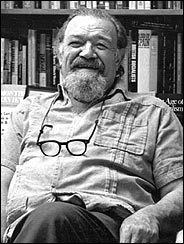Harry Magdoff facts for kids
Quick facts for kids
Harry Samuel Magdoff
|
|
|---|---|
 |
|
| Born | August 21, 1913 Bronx, New York, U.S.
|
| Died | January 1, 2006 (aged 92) |
| Education | City College of New York New York University (BSc) |
| Spouse(s) | Beatrice Greizer (1913-2002) |
| Children | Fred Magdoff |
Harry Samuel Magdoff (born August 21, 1913 – died January 1, 2006) was an important American writer and thinker. He believed in socialism, which is an idea about how society and the economy should be organized. He worked for the U.S. government during President Franklin D. Roosevelt's time. Later, he became a co-editor of a magazine called Monthly Review, which focused on Marxism, another way of looking at society and economics.
Contents
Early Life and Learning
Harry Magdoff grew up in the Bronx, a part of New York City. His parents were immigrants from Russia and were Jewish.
When he was 15, in 1929, Harry found a book by Karl Marx in a used-book store. He said reading it "blew his mind." Marx's ideas about history and economics really interested him. This was around the time of the Great Depression, a period when many people lost their jobs and money. Harry wanted to understand why this was happening. His new interest in Marx's ideas led him to support socialism.
From 1930 to 1933, Harry studied mathematics and physics at the City College of New York. He also took engineering classes. He was part of a student club that discussed social problems. Many of his friends from this club later joined groups that fought in the Spanish Civil War. After 1933, Harry went to New York University. There, he studied economics and statistics and earned a degree in Economics in 1935.
Working for the Government
After college, Harry Magdoff got a job with the Works Progress Administration (WPA). The WPA was a program created by the government during the Great Depression to help people find work. Harry's job was to measure how much different factories could produce. By 1940, he was a main statistician for the WPA.
During World War II, Harry worked for the National Defense and Advisory Board. He also worked for the War Production Board. These groups helped organize what the country needed to make for the war effort. He left government work at the end of 1946.
Life After Government Work
Harry Magdoff was happy to leave his job with the United States Department of Commerce in 1946. He then worked for a business group in New York and later for a laboratory in New Jersey.
He also helped Henry Wallace, who was a former Vice-President, with his speeches and economic ideas when Wallace ran for president in 1948. Because of some concerns about his past activities, Harry couldn't work for the government again. So, in the 1950s, he started a new career in teaching and writing.
After the Cuban Revolution, Harry Magdoff visited Cuba. He had a long meeting with Che Guevara, a famous revolutionary leader. Harry described Guevara as a "sweet and polite man." They talked all night about the challenges the new revolution might face. This meeting created a friendship, and they met again when Guevara visited the United Nations in New York City in 1964.
In 1969, Harry published his first and very important book, The Age of Imperialism. This book sold over 100,000 copies and was translated into 15 different languages. Two years later, after the death of Leo Huberman, Harry started co-editing the Monthly Review magazine with Paul Sweezy. He continued to edit the magazine until he was 90 years old. Harry and Paul wrote five books together, along with many articles for Monthly Review. One of Harry's last books, Imperialism without Colonies, was published when he was 89.
Under Harry's guidance, Monthly Review started to focus more on imperialism. Imperialism is when a powerful country extends its influence over other countries, often by economic or political control. The magazine looked at how this affected global development and the challenges faced by countries in the Third World (developing nations). Harry believed that the Great Depression showed that capitalism (an economic system where private businesses own most things) could have serious problems. He felt that the economy was still at risk of big crises. Harry continued to co-edit Monthly Review with John Bellamy Foster until he passed away.
Family Life
Harry Magdoff had two sons. One of them, Fred Magdoff, became an expert in plant and soil science. Harry's wife, Beatrice, was married to him for almost 70 years. She passed away in 2002.
Images for kids
 | William M. Jackson |
 | Juan E. Gilbert |
 | Neil deGrasse Tyson |


